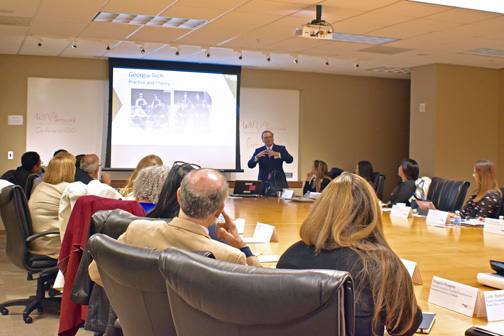Georgia Tech offers temporary office space to P.R. entrepreneurs


David Bridges, director of Georgia Tech’s Economic Development Lab (EDL), the program that hosted the delegation, said the offering follows years of work with partners on the island to develop Puerto Rico’s startup ecosystem.
The Georgia Institute of Technology will offer more than 2,000 square feet of office space — for a four-month period beginning in February 2018 — to entrepreneurs and innovators from Puerto Rico, who are still reeling from the devastating effects of Hurricane María, the university announced.
The Institute will host up to 10 companies — roughly two people each — in Class A office space during that four-month period. The space offering is made possible via Georgia Advanced Technology Ventures Inc., a nonprofit organization and Tech affiliate.
Eligible entrepreneurs are encouraged to apply by Jan. 31, 2018 via this link.
The initiative follows a November 2017 visit to Georgia Tech by a delegation of the “Echar Pa’Lante” (“Move Forward”), a multi-sector alliance based in Puerto Rico and comprised of business and government leaders and educators.
David Bridges, director of Georgia Tech’s Economic Development Lab (EDL), the program that hosted the delegation, said the offering follows years of work with partners on the island to develop Puerto Rico’s startup ecosystem.
EDL, a program of Georgia Tech’s economic development arm, the Enterprise Innovation Institute, assists governments, communities, foundations, entrepreneurs, and small businesses in fostering value creation by applying innovative ideas, technology, and policy to initiatives focused on fostering economic growth.
“One of the most critical needs for entrepreneurs on the island is space and reliable access to energy and telecommunications. By temporarily relocating here, they can continue operations while the situation improves in Puerto Rico,” Bridges said.
“By working in Tech Square, they will have the opportunity to interact with our ecosystem and network, which could lead to potential new business opportunities.”
The temporary space offering follows more than five years of work EDL has done in partnership with universities, private organizations, nonprofits, and the Puerto Rican government in building the innovation and entrepreneurial ecosystem of the island.
Through those longstanding efforts in Puerto Rico, EDL’s work with its partners on the island has resulted in more than $9 million in initiatives and investments being infused into the island’s startup ecosystem.
The delegation of more than two-dozen visitors to the Tech campus included Gloria Viscasillas, Banco Popular of Puerto Rico’s vice president of economic development programs and Echar Pa’Lante leader, Silvio López, Banco Popular senior vice president, Walter Alomar, president of the University of Puerto Rico’s board of directors, and Glorimar Ripoll, the island’s chief innovation officer.
Georgia Tech is ‘good example’ of what UPR wants to achieve
“To have this partnership with Georgia Tech where we can bring our companies and startups to Georgia Tech is very helpful,” Alomar said. “We’re going to continue to send people here, we’re going to continue to share our experiences, and we want to continue to develop this relationship because Georgia Tech is a very good example of what we want to achieve in Puerto Rico with the University of Puerto Rico.”
Alomar and the other delegates were on campus Nov. 27-28 to learn about the Institute’s innovation and entrepreneurship ecosystem and its impact on metro Atlanta and Georgia’s economic development. They also learned about the various components that comprise a successful innovation ecosystem model.
“As chief innovation officer of the government of Puerto Rico, I am both inspired by and committed to being a part of this multidisciplinary team — including Georgia Tech,” Ripoll said. “That will make this innovation ecosystem a reality in Puerto Rico.”
The visit to Georgia Tech and temporary space offering is part of a strategy to support Puerto Rico’s economic recovery. The University Allies of “Echar Pa’lante,” a Banco Popular effort, established a goal to work together on an initiative called the “Block Project.”
Under that project, EPL Universities Allies will collaborate to support entrepreneurs and create economic development activity in the communities that surround university campuses across Puerto Rico.
EPL launched a partnership in 2015 with Georgia Tech to train 800 university professors on evidenced-based entrepreneurship. The long-term goal is that EPL-member schools, which include the University of Puerto Rico–Mayagüez and the Inter American University, will collaborate to create economic development activity adjacent to their respective campuses.
During their visit to Tech, the delegates met with Provost Rafael L. Bras, among other campus leaders, and toured a number of Institute programs and facilities, including the Invention Studio and the Advanced Technology Development Center (ATDC). They also met with leaders from corporate innovation centers at Tech and received an update on the National Science Foundation’s (NSF) $20 million engineering research center project.
Led by Georgia Tech, the NSF Engineering Research Center for Cell Manufacturing Technologies (CMaT) includes a group of universities — UPR Mayagüez among them — that will work closely with industry and clinical partners to develop transformative tools and technologies for the consistent, scalable and low-cost production of high-quality living therapeutic cells.
Project underscores Georgia Tech-PR ties
The CMaT and project as well as the Economic Development Lab’s efforts underscore the longstanding ties between Georgia Tech and Puerto Rico. The relationship goes back to 1895, when the Institute accepted the first group of students from the island, then under Spanish rule.
Most recently, in 2016, Tech conferred 20 degrees to students from Puerto Rico, and there are currently 62 students enrolled at the Institute.
“We are particularly interested in understanding the role that a university, such as Georgia Tech, plays in economic development and how it has specifically helped to accelerate and strengthen the entrepreneurial ecosystem here,” Viscasillas said.
“We are really interested in deepening our understanding of the Georgia Tech model to see what we can do and how we can execute on that model both for development of entrepreneurship within a university and the resulting impact on a community in developing entrepreneurs and helping companies to develop entrepreneurship and growth from within,” she said.













